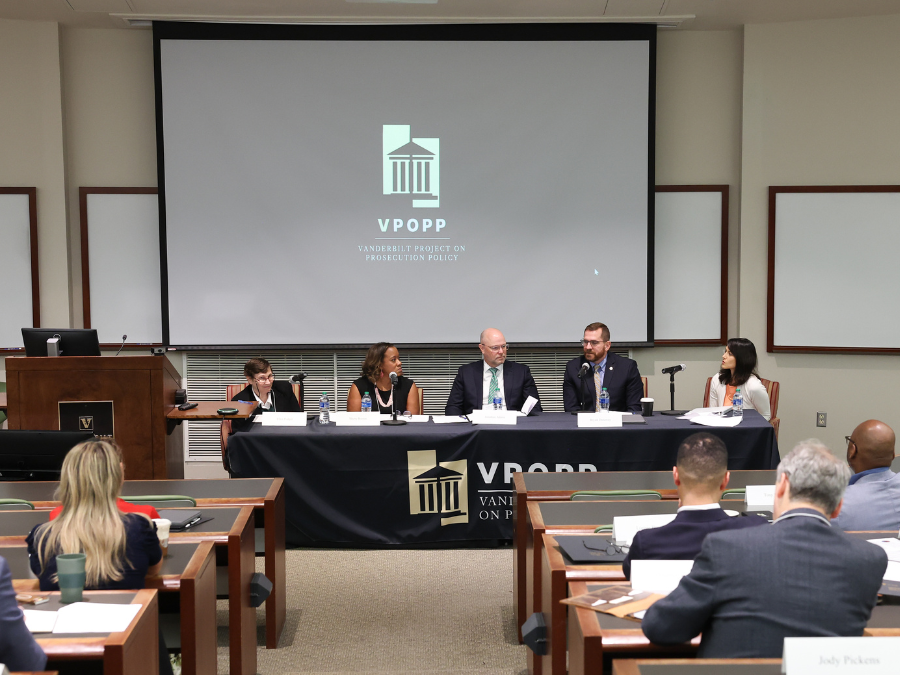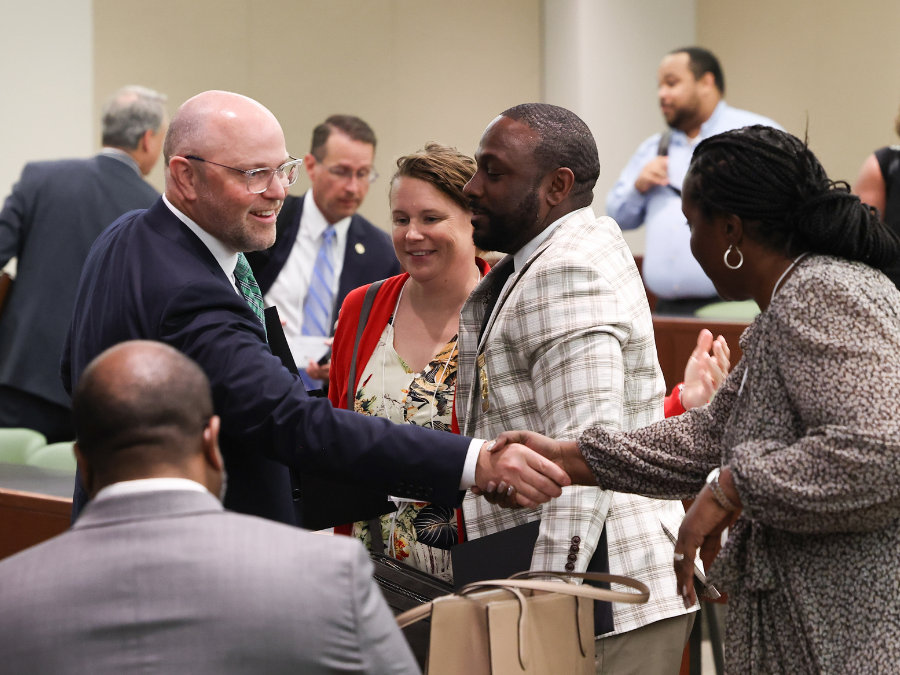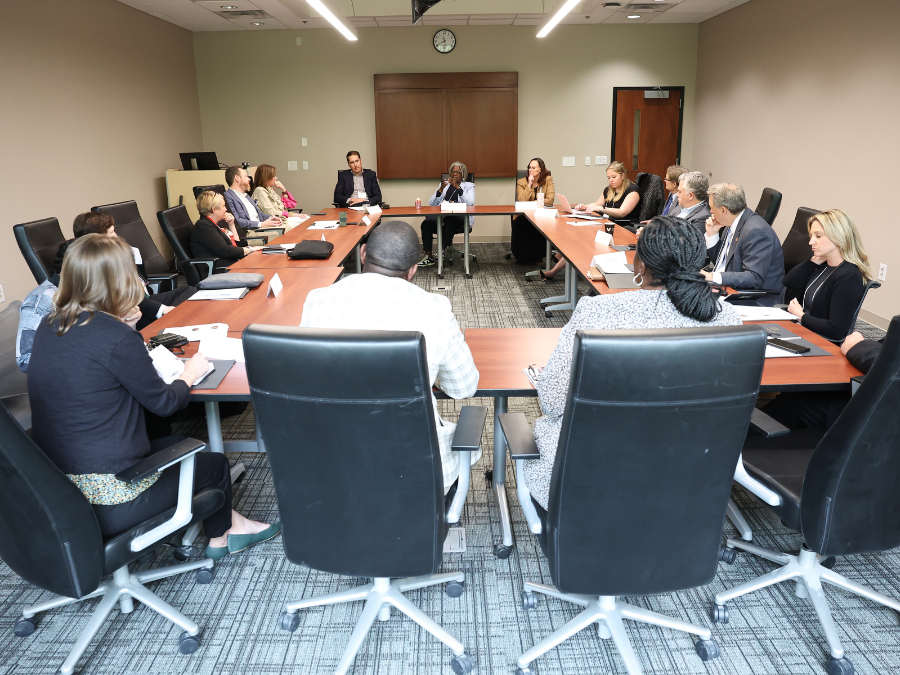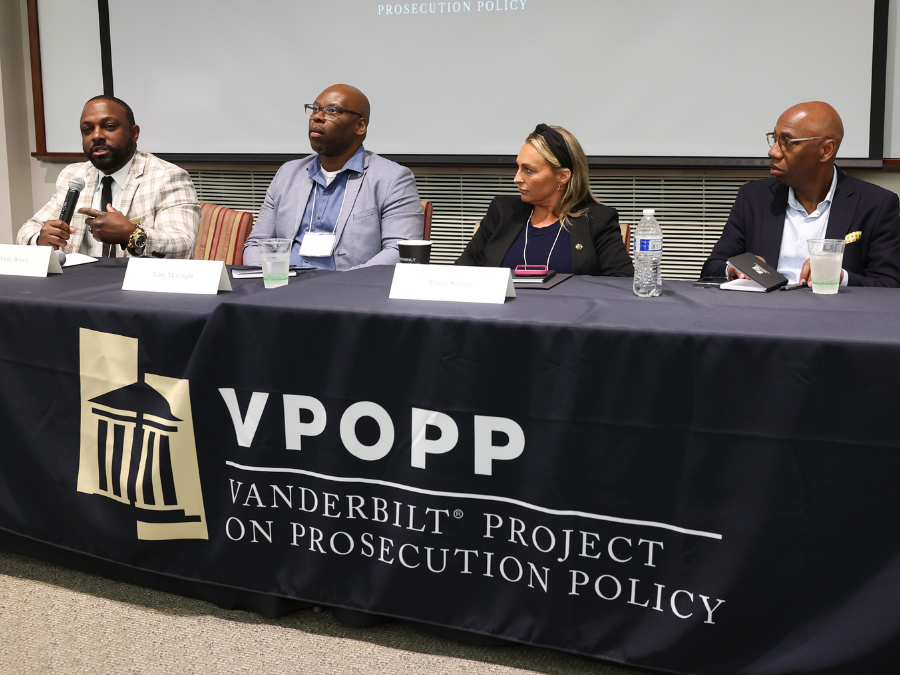by Alissa Heydari
Prosecutors, advocates, and academics recently gathered at Vanderbilt Law School for a summit on “Prosecution in the South: Challenges and Innovative Solutions.” The May 7 convening was organized by the Vanderbilt Project on Prosecution Policy (VPOPP), a new initiative within the law school led by research professor and former prosecutor Alissa Marque Heydari.
Heydari joined the faculty at Vanderbilt last year after serving for several years as deputy director of the Institute for Innovation in Prosecution (IIP) at John Jay College of Criminal Justice.
“One of the things I noticed at IIP was that while there was a great deal of support available to the District Attorneys in the country’s big cities, like New York and Los Angeles, there was less institutional focus on the smaller jurisdictions, particularly in suburban and rural areas,” she explained to the attendees during her opening remarks. “I am thrilled to continue working with these often-overlooked prosecutor offices in the South at Vanderbilt.”
 VPOPP is the Law School’s response to that need – a neutral, nonpartisan, and multi-state platform for elected prosecutors and criminal justice professionals to exchange ideas and best practices. This event included 70 attendees from judicial districts across Tennessee, North Carolina, South Carolina, Georgia, Mississippi, Alabama, and Kentucky, representing Democrats and Republicans, libertarians, liberals, and conservatives.
VPOPP is the Law School’s response to that need – a neutral, nonpartisan, and multi-state platform for elected prosecutors and criminal justice professionals to exchange ideas and best practices. This event included 70 attendees from judicial districts across Tennessee, North Carolina, South Carolina, Georgia, Mississippi, Alabama, and Kentucky, representing Democrats and Republicans, libertarians, liberals, and conservatives.
While VPOPP has no particular agenda of its own, Professor Heydari did articulate the initiative’s broad goals: to help prosecutors find ways to increase public safety in their own communities while reducing unnecessary, wasteful, and expensive incarceration. Those goals informed the design of four panel discussions, with moderated breakout discussion sessions, that unfolded over the course of a full day at the Law School. 
The first panel, “Prosecutorial Independence and Discretion” included comments from District Attorney Jonathan Adams of Georgia’s Towaliga Judicial Circuit; District Attorney Sherry Boston from DeKalb County, Georgia; District Attorney General Bryant Dunaway of Tennessee’s 13th Judicial District; and Stetson University College of Law professor Ellen Podgor.
 This panel was followed by “Capital Punishment: Charging Decisions and General Practice,” which explored the sensitivities prosecutors must face concerning the use of the death penalty. Panelists including Assistant District Attorney and former Tennessee Department of Children’s Services Commissioner Jennifer Nichols, Callie Greer of the Alabama Appleseed Center, and District Attorney Todd Williams from Buncombe County, North Carolina wrangled with some of the complex questions a prosecutor may face when handling a capital case.
This panel was followed by “Capital Punishment: Charging Decisions and General Practice,” which explored the sensitivities prosecutors must face concerning the use of the death penalty. Panelists including Assistant District Attorney and former Tennessee Department of Children’s Services Commissioner Jennifer Nichols, Callie Greer of the Alabama Appleseed Center, and District Attorney Todd Williams from Buncombe County, North Carolina wrangled with some of the complex questions a prosecutor may face when handling a capital case.
Fairness and consistency were at the center of the day’s third panel, “Data Collection and Analysis in Prosecutors’ Offices.” A group including Stephen Crump, Executive Director of the Tennessee District Attorneys General Conference; Jared Fishman, Director of the Justice Innovation Lab; Duke Law School Professor Brandon Garrett; and Solicitor General Scarlett Wilson of South Carolina’s Ninth Judicial Circuit discussed how and why to better collect data in prosecutors’ offices.
An armchair discussion featuring Vanderbilt Assistant Professor of Medicine, Health and Society and of Public Policy Panka Bencsik, Vanderbilt University Law School Professor Jennifer Shinall, and Texas Southern University Professor Howard Henderson provided an overview of how prosecutors can involve researchers and develop rigorous causal studies about prosecution programs and practices.
The last panel, “Innovations in Diversion and Re-Entry Programs,” involved several individuals who had previously been incarcerated and were now committed to repairing and bolstering the re-entry functions in their communities. They included Jerry Blassingame with Soteria Community Development; DeAndre Brown, Director of the Shelby County Office of Reentry; Tony McCright, a program officer at the National League of Cities; and Alaina Sweasy, founder of Lane 13 Consulting.
Throughout the day, several themes recurred in the panel discussions and breakouts: a need to better define the exact role of the prosecutor in the minds of the public, an opportunity to more clearly communicate the many ways they help communities stay safe, and the extraordinary importance of prosecutorial discretion.
Initiatives like VPOPP and convenings like this one may not necessarily be able to make that job any easier, but they can help prosecutors see new ways of doing the job more efficiently, more effectively, and in ways that are deserving of the trust of the people they are sworn to serve.
